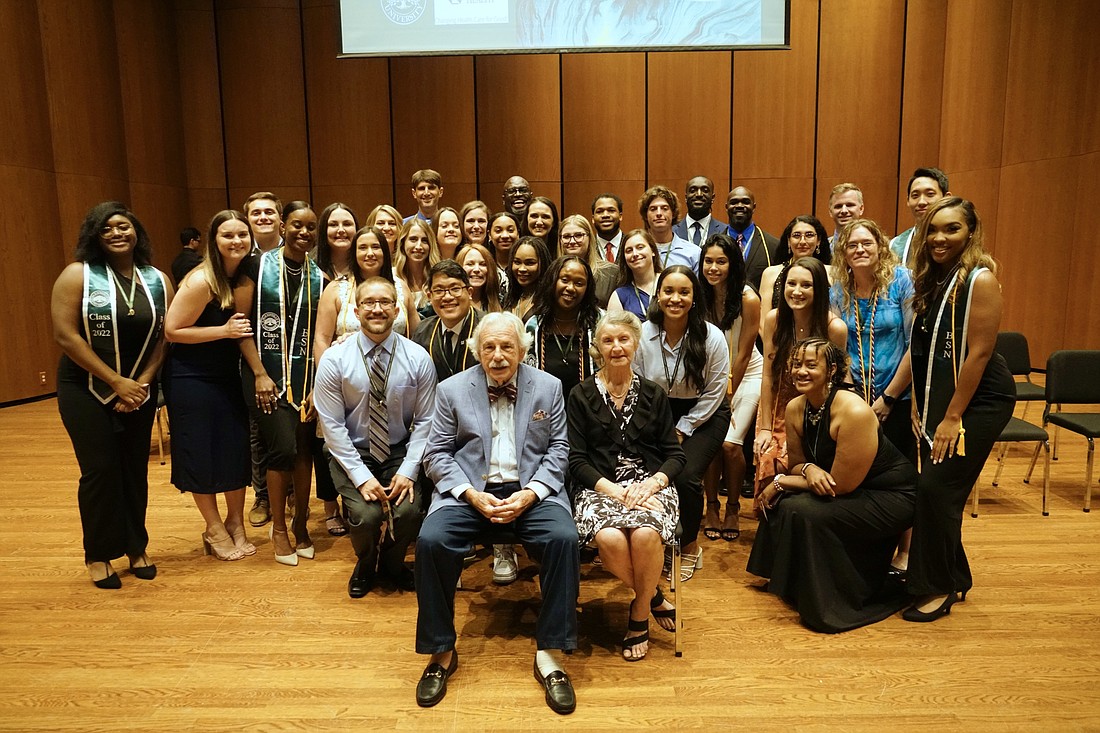
Hospitals in Northeast Florida are not immune from the challenges created by the nationwide shortage of licensed nurses, so Baptist Health and Jacksonville University created a program to increase the health care professional pool.
A study published in February by McKinsey & Company indicates that the coronavirus pandemic has altered many nurses’ career plans.
McKinsey reports that over the past two years, nurses are planning to leave the workforce at higher rates compared with the past decade.
The survey found that 29% of responding RNs in the U.S. indicate they are likely to leave their current role in direct patient care, with many noting their intent to leave the workforce entirely.
McKinsey says the trend is driven by challenges created by COVID-19’s impact on the health care industry.
The report states that even as pandemic cases fluctuate, health care providers are still experiencing the workforce and operational challenges exacerbated by the pandemic.
Patient demand is expected to rise, given the growing and aging population.
Without addressing the potentially wider divide between patient demand and the clinical workforce, with a specific focus on nurses, the health sector could face substantial repercussions.
“For example, as of February 2022, 90 percent of respondents said workforce shortages were a barrier to increasing elective surgery volume, up 11 percentage points from July 2021,” the report states.
The study estimates that by 2025, the U.S. will be 200,000 to 450,000 nurses short of what will be needed to provide adequate patient care.
To help mitigate the predicted workforce shortfall and focus on Northeast Florida needs, Jacksonville University’s Keigwin School of Nursing and Baptist Health are partners in a health care education program that is the only one of its kind in Florida.
The Accelerated Bachelor of Science in Nursing degree compresses the traditional three-year curriculum into a 12-month path to a nursing license and career placement.
The program requires students to already have at least a bachelor’s degree.
Developing the accelerated course of study began two years ago at the peak of the pandemic when JU and Baptist Health decided to take on the impending challenge, said Amber Santos, assistant professor of nursing and director of innovation and quality at the Keigwin School of Nursing.
“It’s not that people don’t want to be nurses. It’s a difficult field to get into. The bottleneck is nursing education because there are only so many classrooms and clinical opportunities,” Santos said.
The first class was selected from a pool of nearly 400 applicants seeking a new career. Some of the students are in their 50s.
“We call them ‘mature students.’ They’ve been there and done that. They know exactly what they want, they are focused and they get it done,” Santos said.
The first cohort of 37 students graduated Aug. 18 after completing 800 hours of classroom study and 800 hours of clinical experience working alongside staff nurses at Baptist Health’s facilities, experiencing more than 30 hours of instruction per week for a year.
“It’s nice having everything condensed because it’s fresh in your mind. You’re in it all the time,” said Kathryn Kane, one of the graduates.
Kane, 32, received a bachelor’s in exercise science at JU in 2012 and then an associate degree in physical therapy before joining the Accelerated Bachelor of Science in Nursing program. She plans to work at Brooks Rehabilitation.
“I like patient care – specifically the older population – and I wanted to get working as fast as I could,” Kane said.
Another graduate, 39-year-old J.B. Donaldson, is a former Army medic. He entered the program with a bachelor’s in health sciences and a master’s in health administration.
Donaldson said the pace of study and the camaraderie with his fellow students reminded him of his military service.
“Having the clinicals overlap with the classes reinforced the teaching. What I learned on Tuesday, I applied on Thursday. There’s not a lot of downtime.”
Donaldson plans to join the staff at Baptist Health when he receives his nursing license.
“I got to know some of the nurses at Baptist and some of them have been there for 30 years. That made me want to go there because people stay for a reason,” he said.
While the benefit for the students is the opportunity to become a licensed nurse after just a year of instruction, the benefit for Baptist is being able to evaluate potential patient care providers.
“It’s not for the faint of heart. It’s a 12-month audition when we can identify the best candidates,” said Elizabeth Bruno, Baptist Health vice president and chief learning officer.
“We look for compassion and caring. It isn’t about just knowledge and skills. We hired most of the class and we got some amazing nurses,” she said.
The graduates who join the staff at Baptist will enter a residency program that matches each new nurse with an experienced clinical coach and mentor.
“It focuses on what they need to know to be practicing nurses and how we deliver care. It’s the final phase to integrate into practice,” Bruno said.
“Critical thinking, clinical judgment and reasoning is what makes a safe practicing nurse,” Santos said.
The inaugural class is a model that can grow to meet the demand for nursing education, said JU spokeswoman Laura Phelps.
“We are planning to expand this to have three start times a year – three overlapping cohorts to triple the size of this program,” Phelps said.